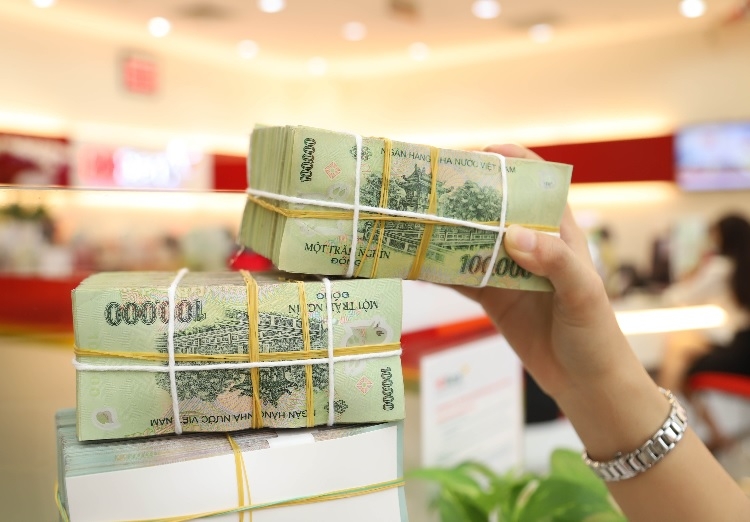US and Vietnam aligning on monetary philosophy
 |
| US and Vietnam aligning on monetary philosophy. Photo: Le Toan |
American diplomat Melissa Brown, the current chargé d’affaires at the US Mission to ASEAN in Jakarta, believed that the positive outcomes in the trade balance between the US and Vietnam are illustrated in the figures of recent years.
“A vibrant dialogue is going on between the US and Vietnam, and that includes all of our agencies. The Treasury and the US Trade Representative’s office have frequent discussions with Vietnamese officials about how to seize opportunities and overcome challenges, and they have had some good news recently overcoming some of these issues, and those conversations continue,” Brown said.
Brown noted the recent emphasis on the trade balance, but believed there is more to it than that. “Of course, COVID-19 has impacted trade and supply chains and so we’re just really grateful to see the vibrant communication continue between our two countries on all of these important issues,” she added.
Vietnamese experts also believed the country is a potentially important partner to the US in achieving its regional geopolitical objectives. In the first seven months of 2021, Vietnam’s exports to the US reached $53.7 billion, up 37.7 per cent over the same period in 2020 and accounting for about 28 per cent of the country’s export turnover.
In mid-August, the State Bank of Vietnam (SBV) lowered the reference exchange rate and changed the method of purchasing foreign currencies from forwarding contracts to spot transactions.
“This move will add a significant amount of liquidity to the banking system,” said Tran Minh Hoang, head of Research at Vietcombank Securities. “This is good news as a more abundant liquidity buffer is vital to ensure the stable operation of the banking system as well as financial markets. Along with that, ample liquidity and lower interbank rates are two criteria that commercial banks appreciate during their conducting package to lower the lending rates.”
The US Treasury Department and the SBV reached an agreement in July to address the former’s concerns about Vietnam’s currency practices.
“It can be seen that this joint statement has allayed concerns surrounding the possibility of the US imposing tariffs on Vietnamese exports. This also confirms the effectiveness of the bilateral negotiation process of state management agencies,” Hoang stated.
He also forecasts that the VND shall appreciate against the greenback this year. “The fluctuation band shall be less than 2 per cent,” he told VIR.
According to Michael Kokalari, who is chief economist of VinaCapital, the fact that tariffs are off the table will encourage foreign direct investment inflows, but this agreement will also benefit Vietnam tremendously over the long term through encouraging inflows from foreign financial investors because they prioritise countries with stable or appreciating currencies.
“When a country artificially depresses its currency to support its exports, the quality of life of its citizens suffers and the crutch of an undervalued currency spawns inefficiencies and warped incentives that ultimately disadvantage most local companies,” Kokalari noted. “In contrast, Vietnam’s appreciating currency will help the country escape the middle-income trap by encouraging innovation because local companies will not be able to rely on a cheap foreign exchange rate to compete. That said, Vietnam’s factory wages are two-thirds below those in China, so Vietnam will still retain its competitive advantage for years to come.”
Kokalari noted that this engagement strategy was promoted in a recent report on the US-China strategy published by the influential Atlantic Council think tank. “The Biden administration’s chief Asia strategist Kurt Campbell reiterated the strategy a few weeks ago when he said the US needs to step up its game in Southeast Asia,” he explained.
This will open a huge opportunity for Vietnam to benefit from US economic assistance that takes the form of a receptive market for Vietnam’s exports, according to Kokalari, which was the same strategy that the US used to support Japan and South Korea during the Cold War.
What the stars mean:
★ Poor ★ ★ Promising ★★★ Good ★★★★ Very good ★★★★★ Exceptional
Related Contents
Latest News
More News
- Private capital funds as cornerstone of IFC plans (February 20, 2026 | 14:38)
- Priorities for building credibility and momentum within Vietnamese IFCs (February 20, 2026 | 14:29)
- How Hong Kong can bridge critical financial centre gaps (February 20, 2026 | 14:22)
- All global experiences useful for Vietnam’s international financial hub (February 20, 2026 | 14:16)
- Raised ties reaffirm strategic trust (February 20, 2026 | 14:06)
- Sustained growth can translate into income gains (February 19, 2026 | 18:55)
- The vision to maintain a stable monetary policy (February 19, 2026 | 08:50)
- Banking sector faces data governance hurdles in AI transition (February 19, 2026 | 08:00)
- AI leading to shift in banking roles (February 18, 2026 | 19:54)
- Digital banking enters season of transformation (February 16, 2026 | 09:00)

 Tag:
Tag:




















 Mobile Version
Mobile Version